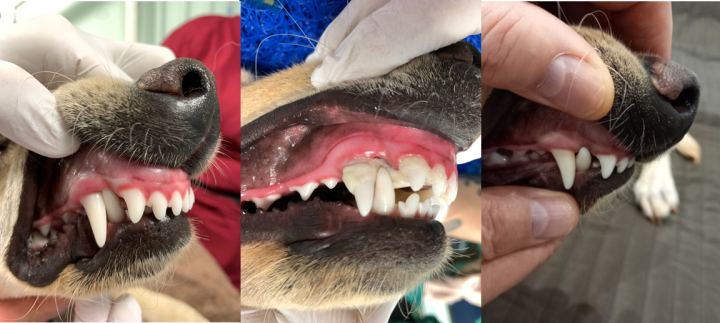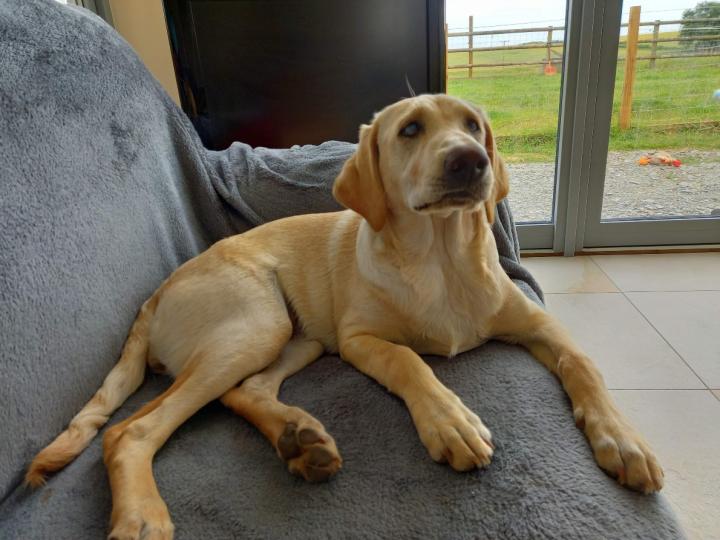Dog benefits from innovative dentistry procedure
Dentistry Service uses brace to successfully realign dog’s canine tooth.


A dog whose misaligned canine tooth was causing it severe pain has successfully had her tooth realigned after being fitted with a orthodontic bite plane.
Minnie, a six-month-old Labrador Retriever, was born with a genetic condition known as lingually displaced mandibular canine teeth. This caused one of her bottom canine teeth to grow in the wrong direction. As a result the tooth dug into and damaged her upper gum, causing her a lot of pain.
Minnie’s vet referred her the specialist Dentistry and Oral Surgery Service at our Hospital for Small Animals, where Ingrid Tundo, European Diplomate in Veterinary Dentistry, assessed her.
Genetic condition
Lingually displaced mandibular canines often result in a dog’s bottom baby and/or adult canine teeth erupting in an incorrect position. Minnie was also born with a mild mandibular distoclusion, which means that her lower mandible is shorter than normal.
Collectively, these conditions resulted in one of Minnie’s lower adult canine teeth to tip forward and damage the soft tissue of the gum between her upper canine tooth and third incisor.
Orthodontic device
Canine teeth provide important structure to a dog’s mouth. Keen to avoid invasive procedures to shorten or remove the troublesome bottom canine tooth, Dr Tundo fitted an orthodontic device called an Inclined Bite Plane to Minnie’s upper jaws. The device was left in place for six weeks, during which the lingually displaced adult canine tooth was successfully tipped back into a normal position.
We were delighted to provide such a non-invasive treatment for Minnie and that the procedure was a success. As with most patients with lingually displaced canine teeth, Minnie presented at a young age making the advantages of regaining normal function of this important permanent tooth, and avoiding its extraction, even more beneficial.
Our specialist Dentistry Service worked with the referring veterinary surgeons and suitable treatment options were discussed with Minnie’s owners to provide the best solution for their pet. Minnie was a fantastic patient and we are happy to have been able to help her.
Minnie’s condition is developmental and hereditary. Dogs with lingually displaced mandibular canine teeth, or their parents and siblings, should be discouraged from breeding to ensure that the problem does not pass to future generations.
The Dentistry and Oral Surgery Referral Service at the Hospital for Small Animals provides advanced treatment for any patient with disorders of the jaw, face or mouth. The team has a wealth of knowledge and experience and is led by Dr Tundo, the only Diplomate of the European Veterinary Dental College in Scotland, and Claire Harrison, the only Veterinary Technician Specialist in Dentistry in the UK.
About the Royal (Dick) School of Veterinary Studies
The Royal (Dick) School of Veterinary Studies is a one-of-a-kind centre of excellence in clinical activity, teaching and research. Our purpose-built campus, set against the backdrop of the beautiful Pentland Hills Regional Park, is home to more than eight hundred staff and almost fourteen hundred students, all of whom contribute to our exceptional community ethos.
The School comprises:
The Global Academy of Agriculture and Food Security
The Hospital for Small Animals
The Jeanne Marchig International Centre for Animal Welfare Education
We represent the largest concentration of animal science-related expertise in Europe, impacting local, regional, national and international communities in terms of economic growth, the provision of clinical services and the advancement of scientific knowledge.

